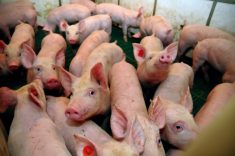CNS Canada — How will Canada’s supply management system stack up against America’s domestic supports if the Trans-Pacific Partnership (TPP) comes to fruition?
It’s a question that hasn’t been answered, say some experts from Canada’s farming institutions.
“It would be completely unfair if we have to compete with lower prices, because those lower prices are the result of subsidization in the U.S.,” said Yves Leduc, director of international trade at Dairy Farmers of Canada.
The most recent U.S. farm bill, passed in 2014, offers generous financial support to agricultural and dairy producers — helping keep prices low.
Read Also

U.S. grains: Soy futures post biggest monthly gain in nearly five years on China trade optimism
U.S. soybean futures climbed to a 15-month high and posted their biggest monthly gain in nearly five years on Friday following a rally fueled by the prospect of revived exports to China.
Canadian farmers wouldn’t be on a level playing field if Canada’s supply-managed dairy, poultry and egg industries had to compete with subsidized U.S. products.
“On one hand you have the U.S. seeking increased access for dairy, but on the other hand you have a country that is providing significant, massive support for agriculture and dairy in the U.S.,” he said.
Errol Halkai, trade policy consultant at the Canadian Federation of Agriculture, said he would like to see the government maintain supply management with various levels of market access.
“It’s a system that’s working well; we’d prefer to see it intact because we’re paid well, and as a result farmers don’t require domestic support. There’s not the swings in prices that you see outside of supply management.”
The federal government has publicly stated its support for supply management, and has said no TPP deals will be signed unless they benefit Canada.
The TPP is a 12-country free trade agreement across a host of sectors, and its role in agriculture has been a contentious one.
New Zealand, Australia and the U.S. have said they want to see increased access to the Canadian market in a TPP deal.
But the government’s commitment has satisfied many producers, who say they believe the government will protect supply management.
Canada should stand by the market access it provides, said Mike Dungate, executive director at Chicken Farmers of Canada.
“New Zealand and Australia don’t allow chicken imports, not because of tariffs, but because of phony sanitary barriers, because they don’t want to introduce diseases to their pristine islands.”
New Zealand, he said, is trying to protect its industry and he wants to see Canada do the same.
“Canada’s got to push what it wants. It does push what it wants, at the negotiating table.”
— Jade Markus writes for Commodity News Service Canada, a Winnipeg company specializing in grain and commodity market reporting.












